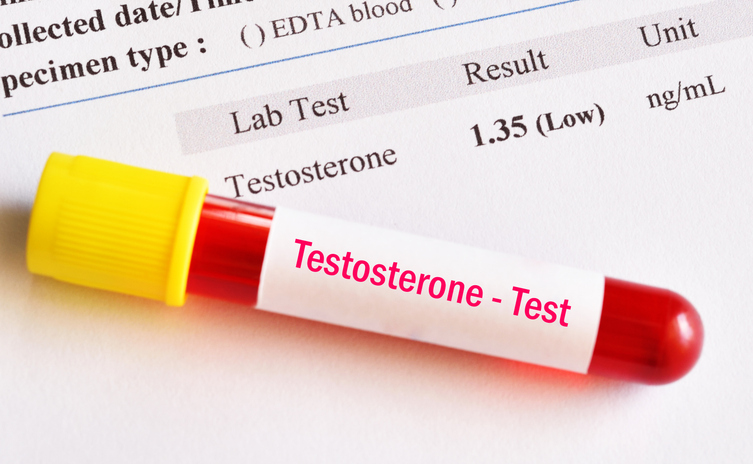It’s Time to Remove the Stigma from Low Testosterone and Be Proactive

By Joy Stephenson-Laws, J.D., Founder
Scott Disick, reality star and father of three of Kourtney Kardashian’s children, candidly shared back in 2020 why he had such low energy and was not feeling his greatest. After being encouraged to take a blood test, he discovered he had “clinically low” testosterone levels at 37-years-old.
“I’m very thankful that there was nothing serious,” he said, according to a report from CNN.
“It could be from a number of reasons, so my doctor suggested I meet with a nutritionist, who did a more detailed blood test to find out why my testosterone is so low and to see exactly what’s working and what’s not working on my body.”
Although common, low testosterone is not something men usually openly talk about. It appears that there is a stigma associated with having a low testosterone level as a man. Some may conclude that a lack of testosterone makes men less strong and "less of a man." Because low testosterone can contribute to erectile dysfunction, another common but not so much talked about men’s health issue, this topic of discussion can leave men feeling ashamed and embarrassed.

“It’s normal for testosterone levels to decline as people age. The average drop is about 1% per year after age 30,” reports the Cleveland Clinic.
“But ongoing research shows decreases that are unrelated to aging. These studies compare people of the same age in different years. (For example, a 45-year-old man in 1987, 1995 and 2002.).”
Lifestyle factors such as being overweight, consuming too much alcohol and a lack of physical activity may be contributing to low testosterone in younger men. Disick made the comment that when he discovered his testosterone was low he was glad it was “nothing serious,” however, low testosterone does need to be addressed and taken seriously.
According to a comprehensive research project that looked at 11 different studies consisting of more than 24,000 men (with a median age between 49 to 76), low testosterone was linked to a higher risk of all-cause mortality as well as a higher risk of cardiovascular death.
"A key finding was that men with a testosterone concentration below 7.4 nmol/L (<213 ng/dL) had higher risk for all-cause mortality, regardless of LH concentration. Men with a testosterone concentration below 5.3 nmol/L (<153 mg/dL) had increased risk of cardiovascular death," according this this Medical Xpress report that discusses the research.
You can be proactive.If it is determined that you have low testosterpne levels, the good news is that there is a lot you can do to boost them without resorting first to testosterone replacement therapy (TRT). But no matter which route you and your doctor take, just be sure to not fall into the trap of “more is better.” Having too much testosterone can be just as harmful as not having enough.
Here are some of the things you can start doing to maintain or boost those levels:
As it does with practically almost every other aspect of getting and staying healthy, getting the right nutrients in the right amounts is critical to helping maintain testosterone at its optimum level. Balance your diet with lots of leafy green vegetables, and make sure you’re getting enough protein. Eat healthy fats from foods such as avocado. Limit the amount of sugar in your diet. Some foods that have been shown to boost or maintain testosterone include:
- Ginger
- Almonds
- Bananas
- Eggs
- Cabbage (helps flush out female sex hormones)
- Garlic
- Honey
- Oysters
- Spinach
- Oats (oatmeal, porridge oats)
- Tuna
- Salmon
- Lemons
These foods are great sources of zinc, magnesium, calcium, vitamin B6, iron, vitamin A, vitamin E and vitamin C, all of which may contribute to healthy testosterone levels. Another important vitamin for testosterone is vitamin D, which you either can get from sunlight or via supplements. If you go the supplement route, make sure to get only those that are manufactured by a reputable manufacturer.

Exercise and practice good lifestyle habits.
- Reduce exposure to environmental toxins and minimize stress – Men had higher testosterone levels two decades ago than they do now, some research shows. An increase in toxins may play a role. A University of Michigan study found that certain chemicals, “phthalates,” found in many plastic and personal care products are associated with lower testosterone levels. Other reasons for testosterone decline may include increased use of pesticides or widespread use of illegal steroid supplements.
- Lose extra fat – Specifically, drop the extra fat around the abdomen (visceral fat). Excess fat can result in less bioavailable testosterone – the testosterone that is accessible for your body to utilize. Having too much fat can also increase your risk for heart problems. Heart problems diminish blood flow to the testicles and interfere with sexual function, causing erectile dysfunction.
- Exercise regularly – Make a goal of at least 150 minutes of moderate exercise a week. Generally, exercise should include cardio and strength training. Interval training and lifting weights are the most beneficial.
- Balance your life – There are a variety of factors that may contribute to low testosterone, including your lifestyle. Make sure you are getting your eight hours of sleep each night and make an effort to reduce the amount of stress in your day-to-day life. I highly recommend looking into My pH Advocate for Stress-Free Patients.
Finally, taking routine nutrient tests is always recommended. Nutritional imbalance can contribute to low testosterone as well as other health issues. If an imbalance or deficiency is identified, a competent healthcare professional can work with you on making the necessary dietary changes and recommend quality supplements if needed.
Enjoy your healthy life!
Disclaimer: This article is not intended to provide medical advice. Please consult with your doctor or another competent healthcare practitioner to get specific medical advice for your situation.
The pH professional health care team includes recognized experts from a variety of health care and related disciplines, including physicians, attorneys, nutritionists, nurses, and certified fitness instructors. This team also includes the members of the pH Medical Advisory Board, which constantly monitors all pH programs, products, and services. To learn more about the pH Medical Advisory Board, click here.



